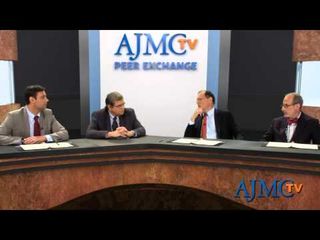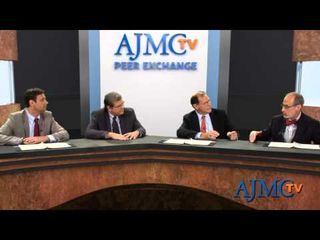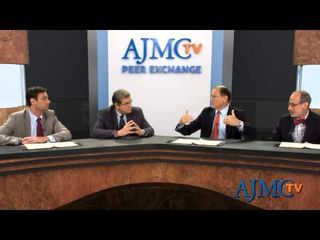
Insurance
Latest News
What we’re reading, December 12, 2016: veterans with dementia who used both the Department of Veterans Affairs healthcare system and Medicare were more likely to be prescribed potentially unsafe medications; HHS will begin to conduct on-site privacy compliance audits in 2017; study finds that women with strong social connections have better breast cancer outcomes.
Latest Videos

More News

An analysis of per capita Medicare spending among beneficiaries with 6 or more chronic conditions reveals wide geographic variations in costs across the US, with similar spending levels often seen in counties neighboring one another.

The group that represents 5000 hospitals outlined a policy agenda that calls for regulatory reform but also seeks some certainty that patients who gained coverage under the Affordable Care Act will be able to retain it in the future.

Prescription drug spending didn't rise as much as it did in 2014, but it still outpaced all other categories.

The physicians said the American Medical Association abandoned a core mission of protecting patients by endorsing a nominee who wants to roll back Medicaid expansion and privatize Medicare.

There has been increased bipartisan support around the expanded role of value-based insurance design.

A nationally representative study among patients enrolled in Medicare, who were diagnosed with cancer, found that out-of-pocket costs averaged at 23.7% of their household income. A majority of these costs could be attributed to hospitalization.

The proposal from CMS may make it difficult for groups that have been providing the DPP to take part in Medicare reimbursement.

What we're reading, November 28, 2016: The GOP is considering reforms to Medicare and Democrats are gearing up for a fight; the IRS will send letters to try to sign more people up for Obamacare; and the abortion rate reaches the lowest level in decades.

Accounting for socioeconomic status in risk adjustment can avoid penalizing hospitals with more low-income patients, according to Ashish K. Jha, MD, MPH, the K.T. Li Professor of Health Policy at the Harvard T.H. Chan School of Public Health and the director of the Harvard Global Health Institute.

The 5th Annual Patient-Centered Oncology Care Meeting closed out with a panel discussion with an eye on the future. Donald Trump's surprise election has caused turmoil in the healthcare industry as the Affordable Care Act seems certain to be repealed at least in part. However, the move to value-based care will likely continue as planned.

What we're reading, November 23, 2016: Alaska has a novel plan to hold down insurance premiums; MedPAC's executive director discusses continuation of value efforts; and new findings regarding microcephaly in Zika-infected babies.

This paper presents a policy proposal to integrate care for Medicare beneficiaries through creation of integrated care organizations and a Medicare home care benefit.

Medicare Advantage beneficiaries use less home healthcare than do their fee-for-service counterparts, but there is marked regional variation in use by both groups.

What we're reading, November 17, 2016: more Medicare doctors are considered high-dollar prescribers; the surgeon general releases a report tackling substance abuse and misuse; and the teen birth rate hasn't dropped as much in rural counties.

Uncertainty was the theme of the day during the 21st annual "Wall Street Comes to Washington" roundtable, hosted by the Leonard D. Schaeffer Initiative for Innovation in Health Policy.

What we’re reading, November 15, 2016: retail health clinics are not associated with decreased emergency department visits; House Speaker Paul Ryan will push for Medicare reform along with repeal of the Affordable Care Act; screening of donated blood finds just a fraction of units are contaminated with the Zika virus.

Be careful what you wish for:Â SGR and FFS will be models of the past; the success of the APM and MIPS will rely on compensation, collaboration and participation; and, to date, much remains to be done in the development of quality-based payment reform under MACRA.Â

A review of our peer-reviewed research in the healthcare and mainstream press.

What we're reading, November 11, 2016: Medicare premium increases lower than expected for high earners; HHS' Office of Inspector General will increase pharmaceutical oversight; and a study on the safety of mail-order abortion pills.

As the Republicans retained control of both the House and the Senate and Donald J. Trump was declared the next president of the United States, it became abundantly clear that President Barack Obama’s landmark healthcare reform legislation was in grave danger.

A healthcare economist explains that not all experiments with new payment models need to succeed, because failure can show the system what not to do.

Treating surgical complications with the best quality care while minimizing costs remains a major challenge for hospitals. Especially when dealing with perioperative complications, hospitals have no unanimous standards for cost and care.

This week, the top stories in managed care included the new Physicians' Fee Schedule released by CMS, a focus on a ballot question in California regarding drug spending, and Patient-Centered Oncology Care announced keynote speaker Roy Beveridge, MD.

Audits, consumer education, and help for states were among the recommendations to force better compliance with the 2008 law, which seeks to ensure that coverage for mental health or substance abuse disorders mirrors other benefits in a health plan.

Read on for a breakdown of what to expect from the near-final MACRA rule announced by CMS on October 14, 2016.













